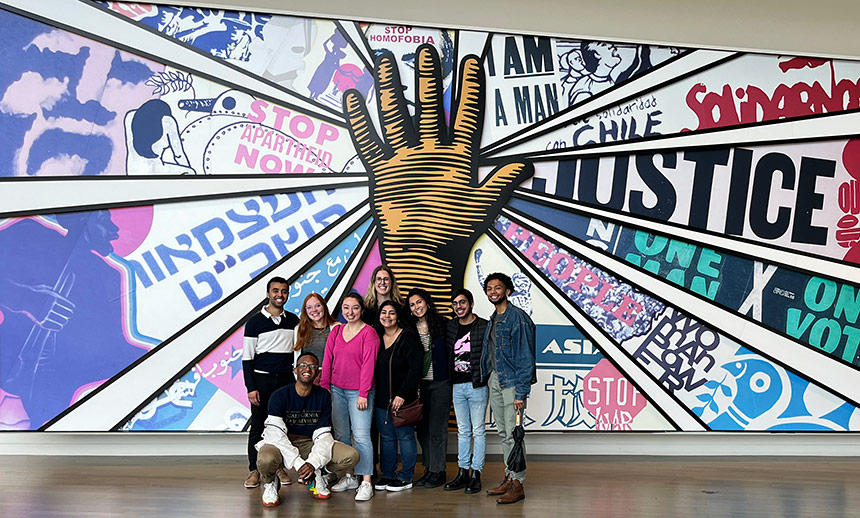
By Gwyneth K. Shaw
Berkeley Law Alternative Service Trips (BLAST) give students a prime chance to get out of the classroom and gain hands-on legal experience all over the country. Intensity is a hallmark of the trips — both at work and at play.
Kendrick Peterson ’24, who co-led this year’s Atlanta trip, says his experience expanded the circle of students he feels in community with. That closeness lasts far beyond the return flight, he says.
“We have a team of 10 students that cover multiple countries, multiple areas and practice specialties, multiple passions, and they all have the ability to sustain and do that work,” he says. “Since we’ve come back to campus, we still have a group chat and we talk a lot about how our work impacted those communities in Atlanta, but also how our different focuses can impact individuals moving forward.
“The biggest thing that I took away from this trip is that community that I built with students who I otherwise would not have ever interacted with.”
BLAST is part of the school’s Pro Bono Program, which also includes 40 Student-Initiated Legal Services Projects, and Call for Necessary Engagement in Community & Timely Response, which pairs students with community partners to help meet urgent needs. Students log thousands of collective pro bono work hours each year, and repeatedly call the program integral to their student experience.
The Pro Bono Program funds BLAST trips to ensure they’re accessible to all students. Each group is co-led by two students, who build and maintain relationships with the supervising attorneys they work with as well as handling travel logistics and helping to foster the relationship between students.
“These students invest their time and their hearts into this service learning experience,” says Deborah Schlosberg, Director of the Pro Bono Program. “The lessons they learn in BLAST stay with them long after the week of work and the skills they build, both legal and leadership, will serve them well as they continue at the law school and as attorneys in the future.”
Ami Shirriff ’24 took her second BLAST trip this spring. After spending time in her home state of Hawai‘i as a 1L, she co-led the trip to Alaska with classmate and Alaska native Drake Goodson.
“BLAST is a great way to apply what you’ve learned in law school to the real world,” she says. “I have loved being able to get to know wonderful organizations in Hawai’i and Alaska and building community. Being able to see how the work we do in law school translates to focus areas I’m passionate about is motivating as well.
“We also spend time during the week meeting with various organizations and attorneys, which is really helpful in trying to figure out where you want to work after graduation.”
Here’s what this year’s BLAST students tackled:
Atlanta
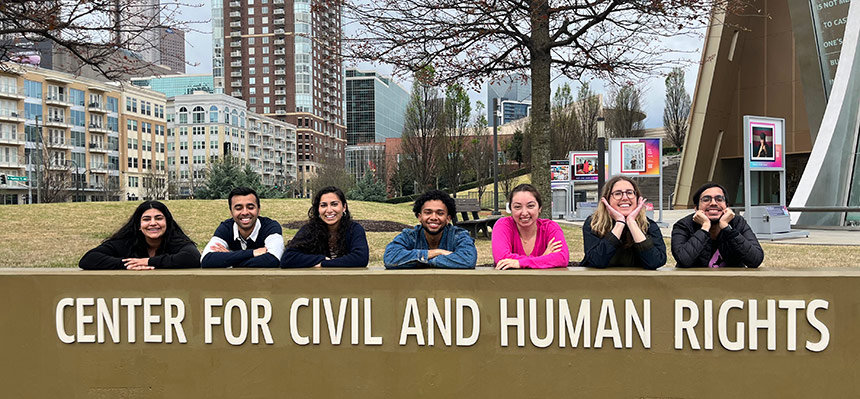
This group, which affectionately dubbed the trip “BLASTlanta,” worked with Atlanta Volunteer Legal Foundation’s Safe & Stable Families Project and Kids In Need of Defense (KIND), doing real-time advocacy at the most elemental level: helping victims of domestic violence get restraining orders and helping children avoid deportation.
“That is direct, and it speaks to our objective, which is not voluntourism or to try and make us feel good,” Peterson says. “Our objective is to try and help and sustain as many people as possible as quickly as possible in the week that we have within Atlanta.”
The combination of intense legal work and personal bonding means students have to switch modes quickly, he adds, but that also builds a skill set wholly different from what they’ve been learning in law school.
“We’ll be at the Waffle House or the aquarium and then we’re writing restraining orders and helping children,” Peterson says. “You have to be able to protect yourself, protect your mental health, protect your value, and be sure you can sustain yourself — but also do the important work that can change someone’s life. And you have to be able to go in every day and every hour and be able to oscillate between those two realities.”
Alaska
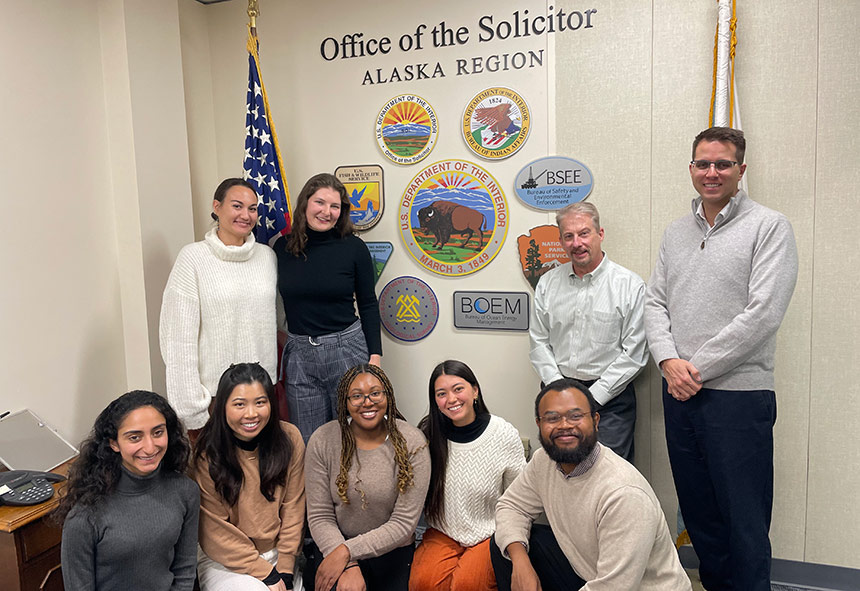
Half the group worked with the Alaska Public Interest Research Group (AKPIRG) to address important legal needs in several areas, including consumer justice and environmental justice. The other half worked with the First Alaskans Institute to support Alaska Natives through indigenous sovereignty research and environmental and resource issues.
Shirriff says she was excited to help Goodson bring a group of students to his native state and loved working with AKPIRG.
“Our supervising attorney, Alyssa, was so kind and helpful,” she says. “It was incredible getting to know her and the work AKPIRG does, along with getting to meet with other attorneys in Anchorage doing meaningful environmental justice work.”
Students were also able to mingle with Berkeley Law alums at an evening event, and enjoyed leisure activities like hiking to Portage Glacier, visiting the Anchorage Museum and Alaska Native Heritage Center, and group dinners.
California’s Central Valley
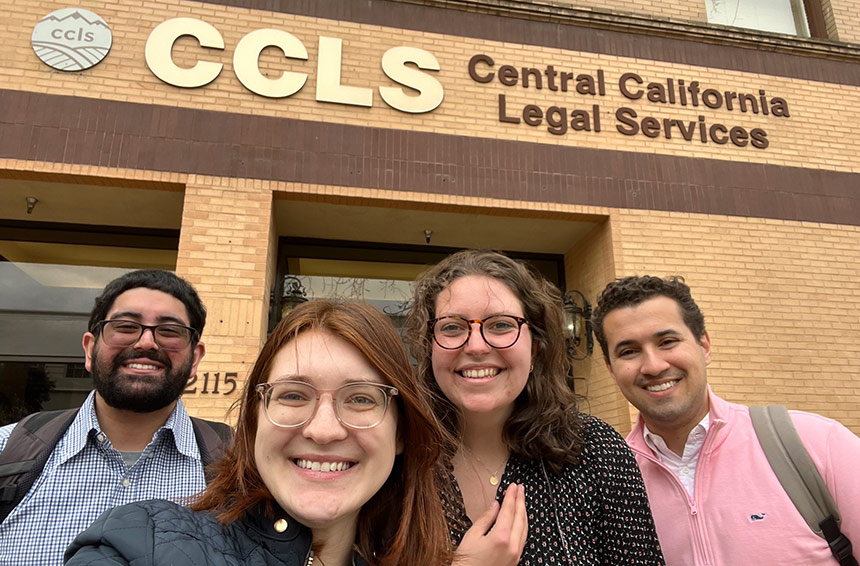
This part of the state is drastically underserved by legal practitioners and is an annual BLAST destination — part of Berkeley’s Law mission as a public law school. As part of the larger effort to bring critical legal help to a large and underserved population, one group of students worked with Central California Legal Services in two areas: staffing a domestic violence clinic and a clinic for incarcerated folks re-entering the community, and conducting research on housing rights with natural disasters and working on “know your rights” materials for the community.
Another group worked with the local KIND chapter, researching immigration laws and helping to file asylum applications for children living in the area.
Students say their supervising attorneys did a great job preparing them for the work, empowered them as a team, and offered great feedback. And the work itself was hugely rewarding.
“BLAST Central Valley reaffirmed my passion of working with a community organization that does immigration advocacy and desire to work with a group that truly helps clients holistically,” Alyssa Young ’25 says.
Hawai‘i
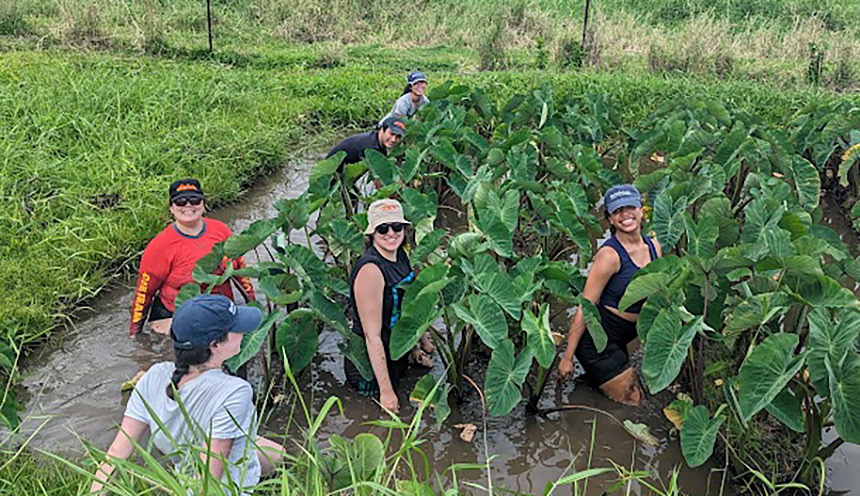
Working under the supervision of the Legal Aid Society of Hawai‘i, students provided direct client services. Through the Native Hawaiian Legal Corporation (NHLC), they did legal research on cases affecting Native Hawaiian cultural and land rights. In the months leading up to the trip, students focused on Hawai‘i’s history and culture and emphasized the anti-colonial approach to human-centered pro bono work.
Kaleinani Nallira ’24 chose the location to pay homage to her Native Hawaiian roots — an imperative passed down from her grandmother. Working with supervising attorneys from the same background was her favorite part of the experience.
“Seeing this representation is so special, and feeling so welcomed and embraced the moment I stepped into NHLC’s office made me forever grateful to the amazing NHLC attorneys and staff,” she says. “Each day, someone from the office would take time out of their day to engage in a cultural activity with us, such as lei making, explaining the significance of the activity, while inviting us to participate in it too.
“I am honored to have worked with NHLC and take part in the amazing work they do for the Native Hawaiian community.”
U.S.-Mexico Border/Tucson, Arizona
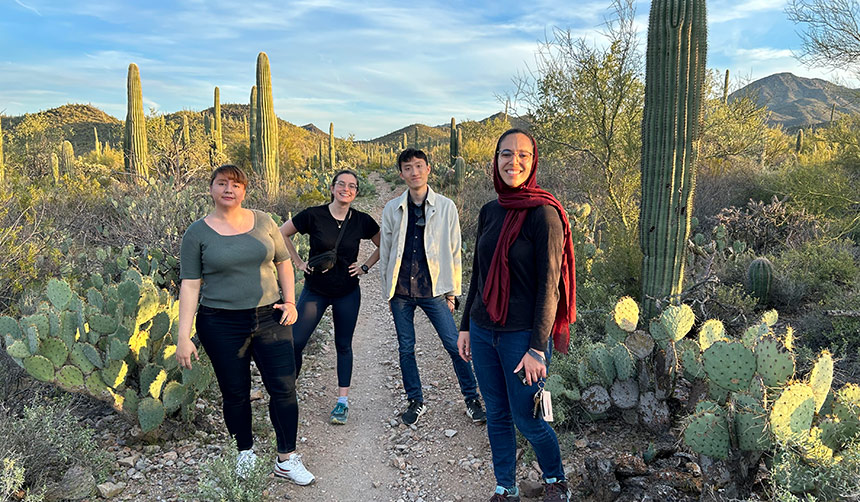
This group worked with the Florence Immigrant & Refugee Rights Project, which provides free legal and social services to detained adults and children threatened with deportation. Students visited the physical border, which is just an hour’s drive from Tucson, including the 30-foot fence at the border crossing into Nogales, Sonora, Mexico.
Mississippi
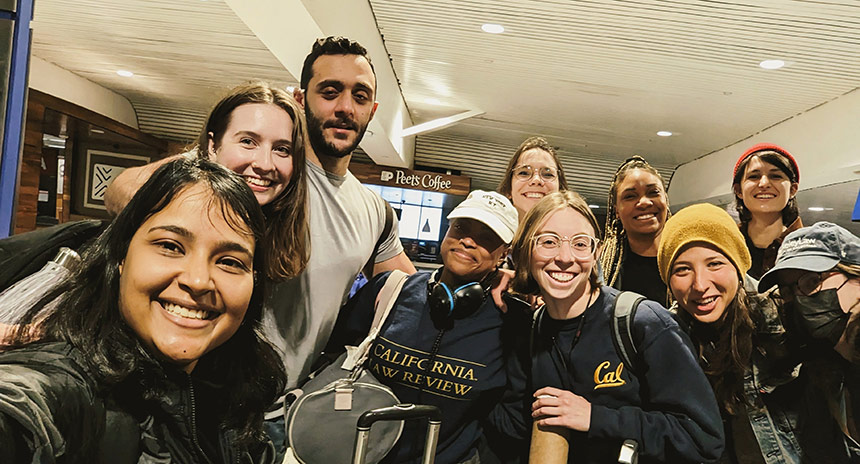
Students worked with the University of Mississippi Law School’s MacArthur Justice Center under the supervision of Professor Cliff Johnson, who leads the center and its litigation efforts.
A lasting impact
For Peterson, BLAST is the perfect complement to coursework.
“In law school, we really focus on things like civil procedure, contracts, and other doctrinal law,” he says. “Quite easily, you lose the feeling and the empathy that you’re supposed to extend to the people we’re talking about. In cases, the people are lost almost immediately. BLAST really fixates on the individuals who are impacted by the law quite directly.”
He recalled the old adage, “If you don’t have a seat at the table, you’re on the menu.” As a Black man, Peterson says he sometimes sees his community reflected in the subject of a case in class. His BLAST work reversed that equation.
“It’s a very, very different situation to be in a position of power, and then utilizing that power to assist and help people who look and sound like me who could benefit from the things that I’ve learned,” he says. “When you do BLAST, and you do the substantive legal aid and research work, you have a seat at the table.
“And now you have enabled us to dictate what is ordered from that menu — to find a way to stop marginalizing communities that are in danger of being on the plate right now.”
Like Peterson, Nallira values the personal connections forged during the program.
“During my first semester of law school, finding community was harder than I expected. Even with mods, I had difficulty finding close friends,” she says. “Through BLAST, not only did I find close friends, I found family. I felt truly accepted by my amazing BLAST team.”
“The BLAST program is a special, caring, and genuine space where students can find their place and find others who are just as passionate about serving underrepresented communities.”